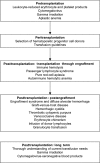A review of transfusion practice before, during, and after hematopoietic progenitor cell transplantation
- PMID: 18583566
- PMCID: PMC2569162
- DOI: 10.1182/blood-2007-10-118372
A review of transfusion practice before, during, and after hematopoietic progenitor cell transplantation
Abstract
The increased use of hematopoietic progenitor cell (HPC) transplantation has implications and consequences for transfusion services: not only in hospitals where HPC transplantations are performed, but also in hospitals that do not perform HPC transplantations but manage patients before or after transplantation. Candidates for HPC transplantation have specific and specialized transfusion requirements before, during, and after transplantation that are necessary to avert the adverse consequences of alloimmunization to human leukocyte antigens, immunohematologic consequences of ABO-mismatched transplantations, or immunosuppression. Decisions concerning blood transfusions during any of these times may compromise the outcome of an otherwise successful transplantation. Years after an HPC transplantation, and even during clinical remission, recipients may continue to be immunosuppressed and may have critically important, special transfusion requirements. Without a thorough understanding of these special requirements, provision of compatible blood components may be delayed and often urgent transfusion needs prohibit appropriate consultation with the patient's transplantation specialist. To optimize the relevance of issues and communication between clinical hematologists, transplantation physicians, and transfusion medicine physicians, the data and opinions presented in this review are organized by sequence of patient presentation, namely, before, during, and after transplantation.
Figures
References
-
- Appelbaum FR. The current status of hematopoietic cell transplantation. Annu Rev Med. 2003;54:491–512. - PubMed
-
- Remberger M, Watz E, Ringdén O, Mattsson J, Shanwell A, Wikman A. Major ABO blood group mismatch increases the risk for graft failure after unrelated donor hematopoietic stem cell transplantation. Biol Blood Marrow Transplant. 2007;13:675–682. - PubMed
-
- Resnick IB, Tsirigotis PD, Shapira MY, et al. ABO incompatibility is associated with increased non-relapse and GVHD related mortality in patients with malignancies treated with a reduced intensity regimen: a single center experience of 221 patients. Biol Blood Marrow Transplant. 2008;14:409–417. - PubMed
-
- Klumpp TR. Immunohematologic complications of bone marrow transplantation. Bone Marrow Transplant. 1991;8:159–170. - PubMed
-
- LaRoche V, Eastlund DT, McCullough J. Review: immunohematologic aspects of allogeneic hematopoietic progenitor cell transplantation. Immunohematology. 2004;20:217–225. - PubMed
Publication types
MeSH terms
LinkOut - more resources
Full Text Sources
Medical


